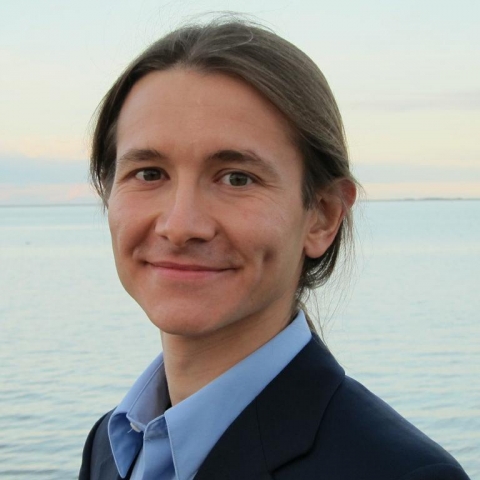
Date:
Location:
Speaker:
Abstract: In the first part of this talk, we describe our recent investigations on the dynamics of a particular class of solitary internal waves, which exhibit recirculating fluid regions, known as “trapped cores” (e.g. Lien et al. 2012). Trapped-core waves are common in the ocean and atmosphere. They may be important for transporting mass, energy, and biological matter across the continental shelf (Shroyer et al. 2010), and may exert large forces on underwater structures. However, several fundamental wave properties, including mass and energy transport, as well as core circulation and density structure, remained to be quantified experimentally. In addition, comparisons between theory and experiments had been complicated by the fact that theoretical models can fail to yield a converged solution at large amplitudes (Helfrich & White 2010), and by the presence of viscous effects at the laboratory scale.
To address these issues, we develop a technique for high-resolution, simultaneous measurements of velocity and density in stratified flows, and thereby extract properties including kinetic and potential energies, as well as trapped core size, circulation and density structure. We complement these results with numerical simulations, which agree closely with our experiments. To overcome issues affecting theoretical models, we introduce a method whose convergence is guaranteed, and develop an extension accounting for viscous boundary layer effects.
In the second part of our talk, we describe our ongoing research on the aerodynamics of large wind farms. While wind turbines are designed in isolation, they are often deployed in arrays comprising hundreds of units, where interactions lead to drastic (up to 40%) losses in power output (Barthelmie et al. 2010). Remarkably, while a theoretical maximum has long been established for the output of a single turbine (corresponding to the classical Betz limit; e.g. Jamieson 2011), no corresponding theory appears to exist for a general, large wind farm.
We develop a model for a large array of energy-extraction devices of arbitrary design and layout. When contemporary designs are considered, the predicted power output is in agreement with field measurements. By considering an “optimal” array, we find a prediction for the maximum performance of a large wind farm. This is several times larger than the output of existing arrays, suggesting that performance improvements may be possible. Guided by these theoretical results, we construct a framework for developing new turbine designs, which are conceived for operation within an array.
Bio: Paolo Luzzatto-Fegiz graduated with a BEng in Aerospace Engineering from the University of Southampton. After a summer working with the ATLAS Magnet Team at CERN, he completed an MSc in Applied Mathematics at Imperial College, and an MS and a PhD in Aerospace Engineering at Cornell University, where he developed theoretical and numerical techniques for studying equilibrium and stability in vortex flows. Upon leaving Cornell, he was awarded a Devonshire Postdoctoral Scholarship from the Woods Hole Oceanographic Institution, where he performed experiments and simulations on long internal waves. He is presently a Junior Research Fellow at Churchill College, University of Cambridge, working in the Department of Applied Mathematics and Theoretical Physics. His current research focuses on the fluid mechanics of large wind farms.
At Southampton, Luzzatto-Fegiz was awarded the Graham prize for best experimental project in the School of Engineering Sciences, together with the Royal Aeronautical Society Prize for highest first-class degree. At Cornell, he received a Graduate Fellowship, as well as the Bolgiano Outstanding Teaching Assistant Award. His doctoral work received the Acrivos Award of the American Physical Society for outstanding dissertation in Fluid Dynamics at a U.S. university. His ongoing research on wind farm aerodynamics is presently shortlisted for a five-year fellowship from the UK’s Royal Academy of Engineering.
Host: Francesco Bullo



